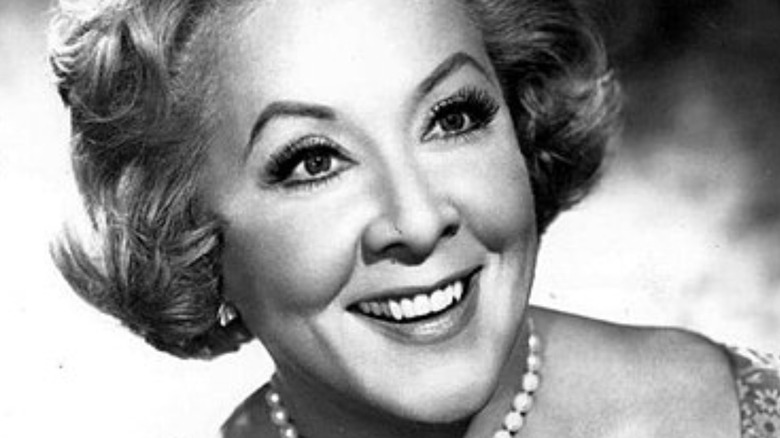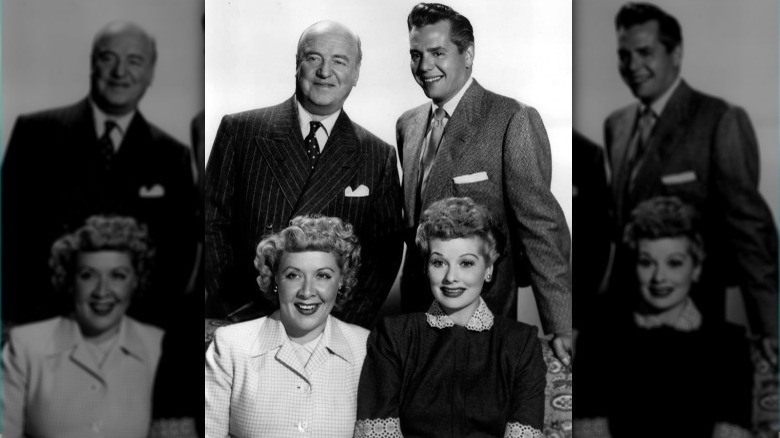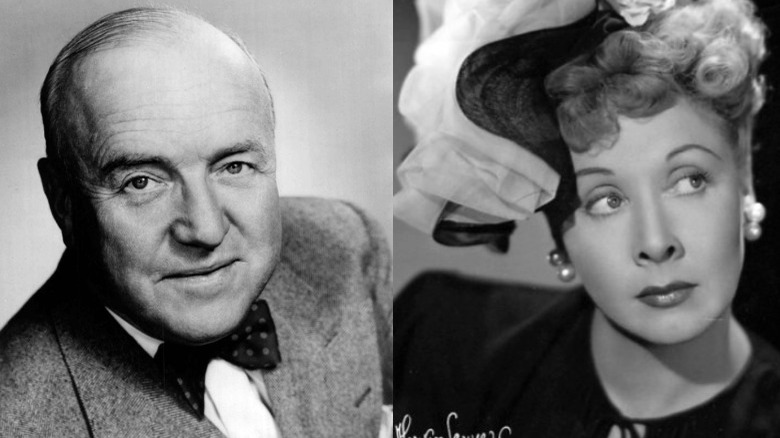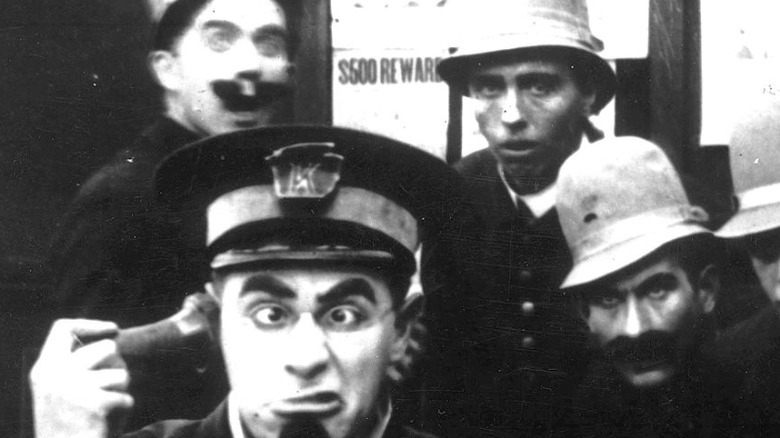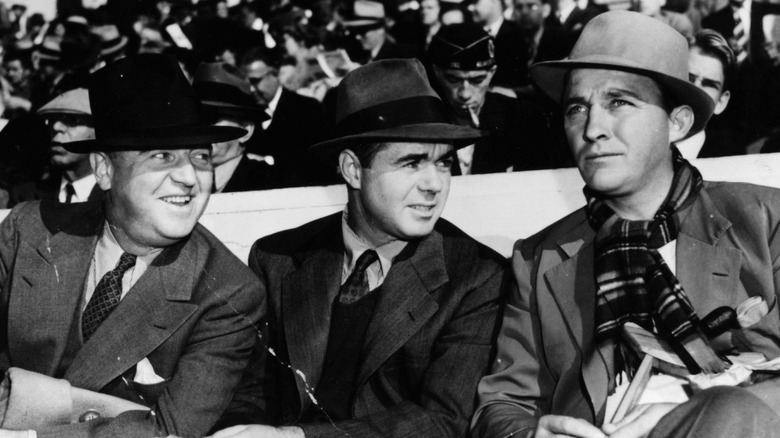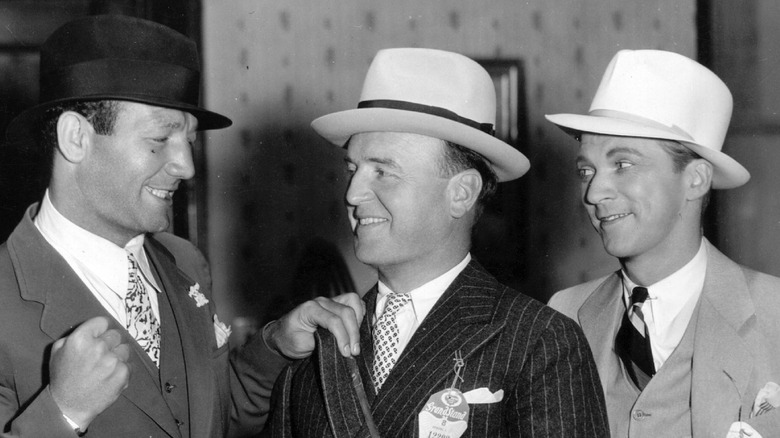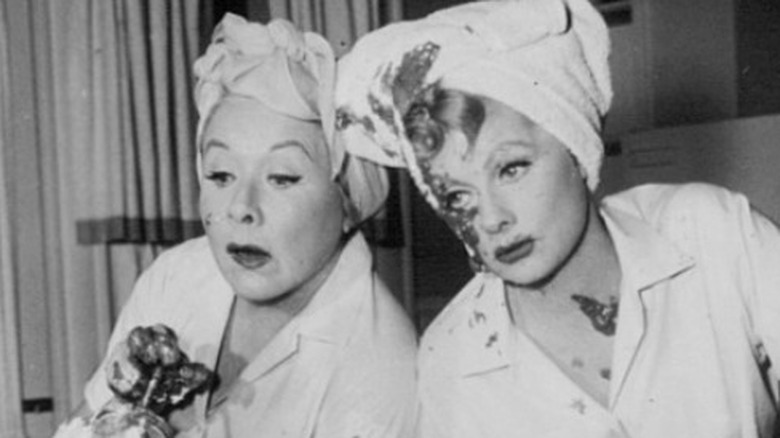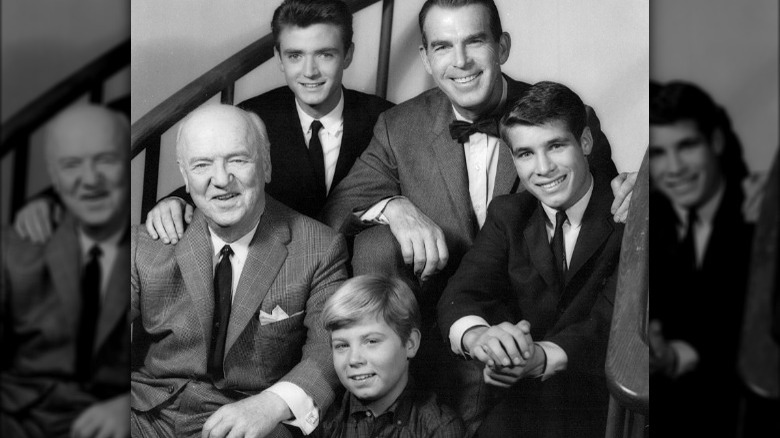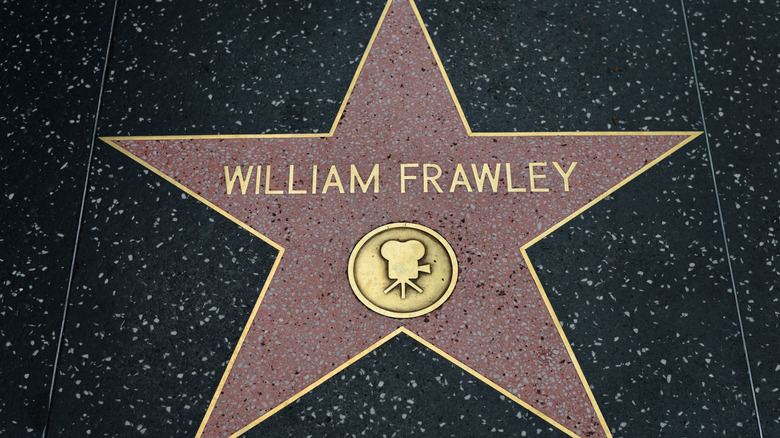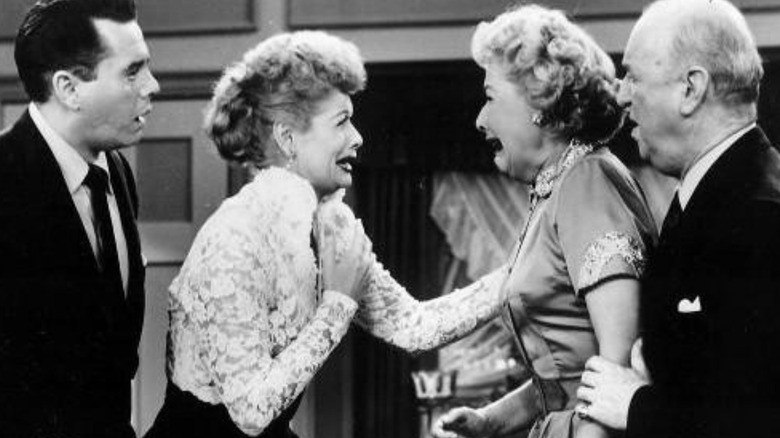Tragic Real-Life Details About Ethel And Fred Mertz From I Love Lucy
When "Being the Ricardos" cast the stars of "I Love Lucy," it wasn't just about Lucille Ball and Desi Arnaz. They also needed their Fred and Ethel Mertz, played by William Frawley and Vivian Vance — the latter of whom became so well-known that Vance once lamented (via Publisher's Weekly): "When I die, there will be people who send Ethel Mertz flowers."
While Vance may have resented being typecast, Frawley remained stubbornly elusive as to his thoughts on starring in one of the biggest shows in television history. He was already a veteran actor by the time he appeared as the Ricardos' landlord, but when J.K. Simmons was cast to play him alongside Nina Arianda's Vance, he found a bit of a problem. "He hung around with jocks and gamblers and drunks," Simmons told Vanity Fair. "And didn't have kids, didn't write a book, didn't leave any of those kinds of legacies. So, all my research about Bill was from other people's point of view."
Fortunately, there were a lot of people who had a lot to say about both Vance and Frawley, starting with their famously fractious behind-the-scenes relationship. Any conversation about on-screen couples who hated each other in real life has to start with them — and that's not all that was going on with the real people behind Ethel and Fred Mertz.
William Frawley and Vivian Vance absolutely hated each other
When Vanity Fair talked to J.K. Simmons about his role as William Frawley (and Fred Mertz) in "Being the Ricardos," he described his approach as "a painting, not a photograph." That meant there was some creative license there, but one thing he had discovered in his research — beyond the shadow of a doubt — was that Frawley and Vivian Vance absolutely hated each other.
Everyone he spoke to agreed that things started off badly at the first read-through of the script for the pilot episode. The much younger Vance remarked on their age difference — she was born in 1909, Frawley in 1887 — and rather ungraciously referred to her on-screen husband as the "old coot." Simmons said the two kept their working relationship professional and didn't let personal animosity get in the way of what they were doing on the show. But when the cameras were off, it was all downhill from there.
Frawley would go on to "My Three Sons," and it was co-star Tim Considine who told Page Six that they were backstage with some military personnel who were getting a tour of the set when one asked what Vance was really like. Frawley's response? It's unprintable, but it reportedly involved That Four-letter Word, usually directed at a woman.
Their hatred for each other even torpedoed a planned spinoff. According to "The Forgotten Desi and Lucy TV Projects," Vance turned down a Mertzes spinoff — and a $50,000 bonus — because she didn't want to work with Frawley again.
Their mothers both condemned their work as sin
Vivian Vance and William Frawley grew up decades apart, but they had something weirdly specific in common: mothers who condemned their career choices as being the work of the devil.
Geoffrey Mark Fidelman is the author of "The Lucy Book," and he talked to Closer Weekly about some of the things he'd learned about Vance while writing about the show. She was one of six children born to a conservative Kansas family, and when she told her mother that she wanted to become an actress, the reaction wasn't great: Her mother accused her of wanting to pursue a career that would tempt men into committing sinful acts.
That belief didn't go away when Vance hit it big. According to "The Other Side of Ethel Mertz," (via the Chicago Tribune), her mother refused to watch a single episode of anything her daughter was in. When Vance offered her parents financial assistance, she was refused. It was "Satan's money," according to her mother.
Frawley's upbringing wasn't far removed, adds Closer Weekly. He was born into a devout Irish Catholic family, and his mother also strongly disapproved of his forays into the entertainment world. His early days were spent moving around the country at his mother's whim, and his career had a series of false starts because of her disapproval.
William Frawley went from the top of the world to... not
William Frawley's addition to the "I Love Lucy" cast came with some massive stipulations: Screw up once, and lose a week's pay. Screw up twice, and you're fired.
That's according to Closer Weekly, and "The Lucy Book" author Geoffrey Mark Fidelman explained just what was going on. By the time Frawley (rear, right) sat down to talk to Desi Arnaz about the possibility of playing Fred Mertz, he'd already gotten a bad reputation for being difficult to work with. Simply put, no one wanted to deal with him anymore.
And he'd fallen a long way. His career started out on the vaudeville stage, where he and his wife, Louise, had a wildly successful act. He'd been front and center as a popular song-and-dance man, debuting songs such as "Carolina in the Morning" and "My Melancholy Baby." After vaudeville — and a divorce — he went on to star in more than 100 movies, sometimes alongside big names like Bob Hope. But by the time "I Love Lucy" was in the works, Frawley's career was in decline.
That happened for a few reasons. For starters, there was his reputation as not being the most dependable name in the business. With so many people vying for roles, that's a big reason to get cut from consideration. Then there was the simple fact that he was aging out of the song-and-dance roles for handsome young men that he'd become so popular for. Hollywood was a young person's place even then.
William Frawley's drinking nearly cost him his career
When Entertainment Weekly took a look at what was true and what was false in "Being the Ricardos," they found that one big truth was William Frawley's struggles with alcohol. Frawley is depicted as the sort of person who orders a drink at 10 a.m., and it was so widely known — and such a problem — that it was one of the major reasons he was having difficulty finding work. It's also why CBS initially said no to his casting in "I Love Lucy."
Desi Arnaz took a stand, though, and Frawley got the role — with the caveat that if he slipped up more than once due to drinking, he would be written out. Frawley kept his end of the bargain, but when it came time for J.K. Simmons to play him, he told Awards Daily that he included something in his performance that he'd noticed in Frawley's: trembling hands.
"His hands tended to shake," said Simmons. "As I watched film of him, he's always protecting himself, so I put my hands in my pockets and on my hips in order to hide my hands."
When Frawley made the switch to "My Three Sons," restrictions on his drinking were no longer in place. Audrey Kupferberg, co-author of "Meet the Mertzes," told Page Six that Frawley would spend most of the day drinking at a place near the studio called Nickodell. It was actor Tim Considine's job to go fetch him from the bar when it was time for his scene.
If you or anyone you know is struggling with addiction issues, help is available. Visit the Substance Abuse and Mental Health Services Administration website or contact SAMHSA's National Helpline at 1-800-662-HELP (4357).
William Frawley made life more difficult than it needed to be
Fred Mertz is best described with words like curmudgeonly and cranky, but according to those who had to work with William Frawley, Mertz was basically a subdued version of the actor who played him.
"The Lucy Book" author Geoffrey Mark Fidelman told Closer Weekly that there were a very limited number of people that Frawley reportedly didn't have a problem with. Those who knew him described him as anti-Semitic, racist, and almost unfailingly misogynistic.
"He didn't particularly care for people," Fidelman explained. "He liked to hang out with his Irish drinking buddies and gambling friends. ... So the writers wrote a lot of that into Fred Mertz, who developed based on the actual personality characteristics Bill Frawley had."
Let's go back to that part about Frawley being misogynistic, because Fidelman says that's undoubtedly part of the reason Frawley and Vivian Vance didn't get along. Fidelman described him as "disrespectful of any female he didn't think was worth trying to get into bed — he had no use for them otherwise."
It was Lucille Ball who once observed that Frawley was pretty much playing himself — and he didn't really seem to care how difficult things on set got because of it.
Vivian Vance advocated for mental health
In 2015, the Albuquerque Museum staged an exhibition on the life of Vivian Vance. Vance had moved to the city when she was a teenager, and it was there that she first really broke into show business. The community was so impressed with her work that, in 1932, they crowdsourced the funds to send her to New York City, in hopes of kicking off her career in a huge way. Later, she continued to return to the same Albuquerque theater for regular performances and helped fund theater expansions.
It wasn't all glitz and glamour, though. According to Alibi, museum curator Deb Slaney says that the stress of working with William Frawley and Vance's frustration at always playing the frumpy sidekick took a toll on her, and that as a result, she had at least one "nervous breakdown."
Vance became one of the first celebrities to discuss depression and mental illness, says Publisher's Weekly. And she didn't just talk about it. She was well-known around Albuquerque for her volunteer work with women in the city's care homes, where she would regularly visit. "She would listen as they talked, because she knew how important it was for people with mental illness to know that somebody was hearing them," Slaney explained.
According to her obituary in the Los Angeles Times, Vance advocated for mental health on a national level, too: She was a board member for the National Mental Health Association.
If you or someone you know is struggling with mental health, please contact the Crisis Text Line by texting HOME to 741741, call the National Alliance on Mental Illness helpline at 1-800-950-NAMI (6264), or visit the National Institute of Mental Health website.
William Frawley suffered a visible decline
William Frawley was in his 60s during the filming of "I Love Lucy." According to Closer Weekly, "The Lucy Book" author says that when the show came to an end, he was still technically under contract with Desi Arnaz and Lucille Ball's company, Desilu. He broke the contract and accepted a role as the grandfather in "My Three Sons." It was there that, as the seasons went on, his health and cognitive function started to noticeably decline.
Actor Stanley Livingston (front) recalled that, while Frawley started out as something like the fun grandfather with all the quirks that everyone expected, it wasn't long before he was forgetting his lines.
Livingston says that Frawley's health started to fail. At first, the show's writers accommodated him by writing scenes where his character could sit rather than stand. Then he started falling asleep mid-scene, and eventually, he was unable to remember more than a line of dialogue at a time. Finally, Frawley suffered a stroke.
He also failed the studio's physical. According to Livingston, the show's producers were told that Frawley might not survive for the rest of the season, so his character was written out of the show and replaced with an uncle played by William Demarest. Livingston explained: "All [Frawley] really had at that time was 'My Three Sons,' and when they took that away from him, he really had nothing to live for."
William Frawley died in 1966
When William Frawley died in 1966, his obituary in The New York Times called him a "good-natured rascal." The paper also reported that, after leaving "My Three Sons," he had undergone surgery for a "prostate condition." More details about his death are found in "Hollywood Death and Scandal Sites."
Frawley spent most of his career — about 40 years of it — living on the top floor of a Hollywood hotel called the Hotel Knickerbocker. (According to Closer Weekly, author and "I Love Lucy" historian Geoffrey Mark Fidelman says that opting to live in a hotel was typical of old vaudeville stars.) His only companion had been his sister, and they had only recently moved to a nearby apartment in a complex called the El Royale. On March 3, 1966, he was walking past the Hotel Knickerbocker when he suffered a massive heart attack. He died on a hotel lobby couch after concerned witnesses dragged him off the street. He was 79 years old.
His NYT obit also quoted his opinion about "I Love Lucy": "I didn't think the thing had a chance. We did the lines over and over again, and it was like eating stew every night — stale and not a bit funny."
Vivian Vance and Lucille Ball shared an emotional goodbye
Vivian Vance also had an obituary in The New York Times. When she died in 1979 at the age of 70, it was requested that any memorial donations be sent to the National Mental Health Association or to the Society for the Prevention of Cruelty to Animals.
Vance had retired to a home in Belvedere, California, after being diagnosed with breast cancer in 1973 and undergoing treatment in New York. By 1979, her cancer had metastasized into bone cancer. Vance's friend Paige Peterson recalled Lucille Ball visiting her former co-star for the last time while Vance was living in Belvedere — where, Peterson said, she was truly happy.
"You could hear them laughing, and toward the end there was a lot of sobbing," Peterson told People. "It was an amazing thing to witness, the love of these two women." And then, when Ball left: "The pain on [Ball's] face shook me to my core. She was in tears. She couldn't speak."
Vance died a few days after Ball's visit, on August 17, 1979. Ball's daughter, Lucie, has spoken often about how devastated Ball was after Vance's death: "She cried about losing Viv for months after that. Viv was, in many ways, like a sister to my mother."
